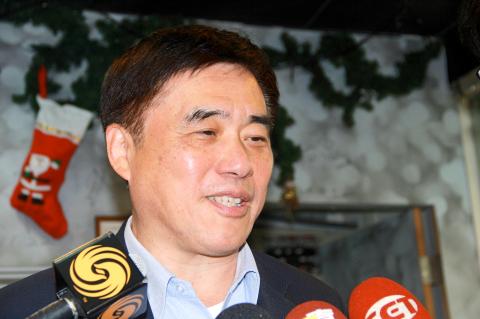An initiative launched by the Chinese Nationalist Party’s (KMT) younger members advocating party reform yesterday announced that it would hold a forum to invite KMT chairmanship candidates to answer questions regarding their plans for the party.
“We are going to hold a forum called ‘Chairman, may I ask a question?’ in the hopes of understanding the candidates’ plans to reform the party and subject them to public scrutiny,” the Grassroots Alliance said in a press statement.
The alliance said a number of KMT members have announced that they would run for party chairmanship, including Deputy Legislative Speaker Hung Hsiu-chu (洪秀柱), former KMT vice chairman Hau Lung-bin (郝龍斌) and Taipei City councilors Lee Hsin (李新) and Chung Hsiao-ping (鍾小平).

Photo: CNA
However, their election manifestos are merely slogans and lack substantial plans for reform, the alliance said.
“That is why we will extend an open invitation to the party chariperson hopefuls and ask them to explain what kinds of reforms they plan to implement,” the statement said.
The alliance was established by a group of younger KMT members on Tuesday following the party’s defeat in the presidential and legislative elections on Saturday last week, with the goals of acknowledging young KMT members’ subjectivity, transforming the KMT into a Taiwan-centric party and bringing the party in line with grassroots voters.
Among the alliance’s members are former KMT Youth League Secretary-General Lee Zheng-hao (李正皓), former KMT International Information and Events Center director Hsu Chiao-hsin (徐巧芯) and KMT Youth League head Hsiao Ching-yan (蕭敬嚴).
As of yesterday, about 2,000 people had signed an online petition endorsing the alliance’s reform plans, which include lowering the hefty registration fee for entering the KMT’s chairperson elections, dealing with the party’s contentious assets and promoting youth participation in politics.
The alliance said while the next KMT chairperson election, which is to be held on March 26, is the party’s internal matter, the party’s next chairperson would inevitably need to persuade the public to embrace the KMT again.
“For this reason, all interested individuals will be allowed to attend the forum instead of just KMT members. The event will be broadcast live over the Internet,” the alliance said, urging the public to become a part of the KMT’s reform movement.

A preclearance service to facilitate entry for people traveling to select airports in Japan would be available from Thursday next week to Feb. 25 at Taiwan Taoyuan International Airport, Taoyuan International Airport Corp (TIAC) said on Tuesday. The service was first made available to Taiwanese travelers throughout the winter vacation of 2024 and during the Lunar New Year holiday. In addition to flights to the Japanese cities of Hakodate, Asahikawa, Akita, Sendai, Niigata, Okayama, Takamatsu, Kumamoto and Kagoshima, the service would be available to travelers to Kobe and Oita. The service can be accessed by passengers of 15 flight routes operated by

GIVE AND TAKE: Blood demand continues to rise each year, while fewer young donors are available due to the nation’s falling birthrate, a doctor said Blood donors can redeem points earned from donations to obtain limited edition Formosan black bear travel mugs, the Kaohsiung Blood Center said yesterday, as it announced a goal of stocking 20,000 units of blood prior to the Lunar New Year. The last month of the lunar year is National Blood Donation Month, when local centers seek to stockpile blood for use during the Lunar New Year holiday. The blood demand in southern Taiwan — including Tainan and Kaohsiung, as well as Chiayi, Pingtung, Penghu and Taitung counties — is about 2,000 units per day, the center said. The donation campaign aims to boost

MORE FALL: An investigation into one of Xi’s key cronies, part of a broader ‘anti-corruption’ drive, indicates that he might have a deep distrust in the military, an expert said China’s latest military purge underscores systemic risks in its shift from collective leadership to sole rule under Chinese President Xi Jinping (習近平), and could disrupt its chain of command and military capabilities, a national security official said yesterday. If decisionmaking within the Chinese Communist Party has become “irrational” under one-man rule, the Taiwan Strait and the regional situation must be approached with extreme caution, given unforeseen risks, they added. The anonymous official made the remarks as China’s Central Military Commission Vice Chairman Zhang Youxia (張又俠) and Joint Staff Department Chief of Staff Liu Zhenli (劉振立) were reportedly being investigated for suspected “serious

ENHANCING EFFICIENCY: The apron can accommodate 16 airplanes overnight at Taoyuan airport while work on the third runway continues, the transport minister said A new temporary overnight parking apron at Taiwan Taoyuan International Airport is to start operating on Friday next week to boost operational efficiency while the third runway is being constructed, the Ministry of Transportation and Communications said yesterday. The apron — one of the crucial projects in the construction of the third runway — can accommodate 16 aircraft overnight at the nation’s largest international airport, Minister of Transportation and Communications Chen Shih-kai (陳世凱) told reporters while inspecting the new facility yesterday morning. Aside from providing the airport operator with greater flexibility in aircraft parking during the third runway construction,